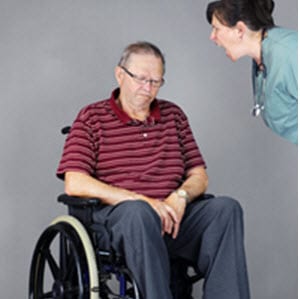 Free Consultation (610) 667-7511
Free Consultation (610) 667-7511  Free Consultation (610) 667-7511
Free Consultation (610) 667-7511  Nursing Home Abuses Often Occurs Due to Staffing Issues
Nursing Home Abuses Often Occurs Due to Staffing IssuesNursing home abuse is a tragic epidemic across America, including here in Pennsylvania and New Jersey. This epidemic is spreading serious injuries and even death to elderly citizens who have entrusted their care to supposedly qualified long-term care facilities.
Most nursing home abuse cases aren’t reported because:

A stressful work environment is the biggest factor that leads to nursing home abuse.
There are several factors the can lead to the abuse of elderly residents in nursing home or long-term care facilities. The most common factor is a stressful work environment. In 2005, the National Center on Elder Abuse (NCEA) published a risk prevention profile and checklist and listed some of the facility risk factors that lead to elderly patient abuse some of which are:
The elderly is the fastest growing group in the U.S. This is due to advances in modern medicine and the general increase in healthy lifestyles. This increase in the number of older people means that there are a great number of individuals who need substantial medical care. Often, family members cannot supply the necessary medical care in their homes, requiring their loved ones to enter long-term care facilities. This greater need for care is not being met with appropriate increased staffing in nursing homes.
With the elderly population on the rise, quality care for those in need is in great demand. There are more elderly people living today that require assisted living than in any prior time period. One of the main causes for abuse in nursing home is under-staffing. There simply aren’t enough qualified medical caretakers to fill the positions. This, in turn, leads to patients being cared for by too few staff or staff who are unqualified.
Not only are caretakers forced to care for too many patients, they may have to work double shifts or mandatory overtime. Because the staff numbers are low, supervisors are forced to double dip into the staff pool to cover the schedule. Being overworked can cause the nursing home staff stress. When staff members are working under stress, they are more likely to take out their frustrations on their patients, especially those with challenging behaviors.
One of the reasons nursing homes are understaffed is the high turnover rate that is prevalent among these types of facilities. A 2010 ACHA survey showed that CNAs, LPNs, and RNs had the lowest retention rate among the nursing staff. CNAs and RNs had the highest vacancy rates and the highest turnover rates. CNAs (Certified Nursing Assistants) are responsible for much of the direct, hands-on resident care. If these nursing positions are constantly being left open, this can cause problems for patients that need consistent care. For example, a patient with dementia benefits greatly from routine care from the same medical staff every day.
Negative effects of high turnover rate in nursing homes:
Nursing homes that are understaffed put the administrators under pressure to fill the vacancies as quickly as possible to help alleviate the hectic situation. The manager conducting interviews is in a rush to fill those vacancies, so they might skip some crucial steps during the hiring process. Supervisors might not check references, perform background checks, or conduct a comprehensive interview. This could result in new employees that are under-qualified for the position or even have a past criminal record for abuse. These new employees are potentially dangerous to the residents. The under-qualified employees don’t know how to fully care for patients that require extra attention. If someone with a questionable background was hired, they might not be fully rehabilitated and could fall back into their previous criminal behavior. Not screening new employees thoroughly can leave elderly patients’ care in the hands of people who don’t know what they’re doing or those who mean to take advantage of them. In addition, both Pennsylvania and New Jersey require background checks.
Another one of the factors that have been found to lead to nursing home abuse is that some caretakers who work closely with patients lack sufficient training. Many of them are not trained to handle aggressive patients, don’t know how to recognize and report abuse, and cannot manage the stress or anger they might feel while at work. These are all serious issues which should be addressed through continual training sessions for those that work in a nursing home. Training should never be a “one and done” situation.
A nursing home caretaker needs to know how to handle an elderly patient that has challenging behaviors. Unfortunately, not all of employees are trained in this area. When elderly patients become combative, some caretakers get firm with them physically and justify it by saying that they are protecting themselves from the patient. In some cases, inappropriate amounts of medication are utilized to sedate the patients. Or restraints are used. Both are illegal.
Still other caretakers have the misperception that the elderly are like children and treat them as such. They might scold the resident or even smack them for “misbehaving” without thinking that they are emotionally and physically abusing their patient. Other medical staff have said that hitting a patient was a reflex to being startled by the patient. Some residents have hit, pinched, and even bitten their caretaker and they have in turn hit the patient back “as a reflex.” Those caretakers say that the startled reaction may be a result from the stressful work environment.

Improperly trained medical staff may lash out at elderly patients that have challenging behaviors because they aren’t properly trained on how to work with such patients.
The common thread when it comes to staff abusing patients is a stressful work environment which is not being handled properly by nursing home owners. Insufficient staff and lack of training seems to be the biggest contributing factor to the problem. A nursing home facility with too few medical staff and too many patients doesn’t give the caretakers enough time to attend to their patients and to get to know them. Establishing a relationship between the patient and the caretaker is beneficial to patient care. This sort of relationship helps the caretaker know the patient’s needs and wants, likes and dislikes. It also allows the caretaker to bond with the patient. This is even more critical to create a trusting relationship between patients that require a routine, such as those with dementia or Alzheimer’s disease.
Regardless of how stressful a nursing home environment may be, abusing an elderly resident is inexcusable and unlawful. Long-term care facilities are responsible for providing the right amount and kind of care. Failure to do so is negligent. If you suspect that your loved one is being abused, contact the dedicated attorneys at owenthal & Abrams, Injury Attorneys today for a no fee consultation. We have over 40 years of experience fighting for those who have been wrongfully injured and we are here to help you.
LOWENTHAL AND ABRAMS, P.C.

Contact us for a FREE consultation. No fee unless compensated.